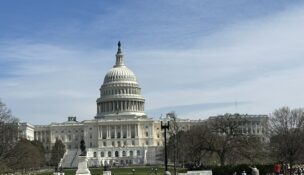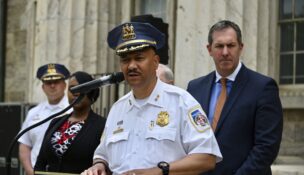Assembly delays budget debate to Wednesday
By: Associated Press//June 14, 2011//
By
SCOTT BAUER
Associated Press

MADISON, Wis. (AP) — The debate over Republican Gov. Scott Walker’s budget plan, which Democrats decry as an attack on the middle class, was delayed Tuesday night while both parties waited for a host of changes to be drafted to the $66 billion spending plan.
Assembly Republican leaders announced shortly after 10 p.m., more than 11 hours after their scheduled start time, that they were delaying the beginning of debate until 1 p.m. Wednesday.
The announcement marked an anticlimactic end of a day that was full of twists and turns — most notably a surprise Wisconsin Supreme Court ruling that upheld the contentious state law that strips most public workers of their collective bargaining rights. The ruling, handed down around 5 p.m., took the issue off the table for Republicans, who were prepared to add it to the budget.
There were plenty of other hot-button issues in the budget, which attracted about 2,500 protesters to the Capitol during the day.
Walker’s plan would slash funding for public education and Medicaid in order to help balance a $3 billion shortfall. Democrats vowed to try to change the GOP-backed proposal, which they said slams Wisconsin education, the poor and middle class.
“This budget is an assault, an attack on all the values we share in Wisconsin,” said Assistant Democratic Minority Leader Rep. Donna Seidel of Wausau. “This is not an honest budget. We are going to hold our Republican colleagues’ feet to the fire.”
The budget bill would cut spending on public schools by $800 million and reduce their ability to make up the difference through property tax increases. It also would cut $500 million from the state’s Medicaid programs and cap enrollment for Family Care, a program designed to keep poor, elderly residents out of nursing homes.
The bill also would slash money for the University of Wisconsin System by $250 million.
Several changes to the budget were expected, including allowing UW to receive about $40 million to pay for broadband Internet service in schools and libraries across the state. Other expected changes relate to the expansion of voucher schools to Green Bay and a new requirement that local governments use private contractors for certain public works projects.
Republicans have defended the budget as a responsible plan that does away with a $3 billion shortfall without raising taxes and holding property taxes essentially flat over the next two years.
Republicans control the Assembly 59-38-1 with one vacancy. They also control the Senate 19-14.
Protesters organized rallies at the Capitol all day Tuesday to demonstrate primarily against the budget but also the collective bargaining provision, which was expected to be debated again.
The first time the union legislation was considered, in February and March, tens of thousands of protesters converged on the Capitol.
Police said Tuesday’s crowd reached a peak of about 2,500 during a late afternoon rally organized by union leaders and others. Three people had been arrested as of 4 p.m., including one for disorderly conduct and two for possession of drug paraphernalia.
Several protesters said they wanted to speak out against the collective bargaining plan and the overall budget. They were also voicing support for recall elections targeting six Republican state senators who voted for the union bill. Three Democrats also are facing recall elections.
“I just want to make it very clear that people are not behind this budget,” said Tanya Lohr, a 38-year-old high school teacher from West Bend.
Pat Onsager, a special-education teacher from Madison, said he wasn’t sure whether his protesting would make a difference but he came anyway because he couldn’t be passive as an injustice developed in his state.
“It’s power to the people,” said Onsager, 44. “If I’m not here, how am I supposed to raise my kids and teach them to do the right thing?”
While the court’s ruling negated the need for the Assembly to vote on the entire collective bargaining proposal again, lawmakers were looking at a new exemption for transit workers.
The collective bargaining law requires all public employees to pay more for their health care and pension benefits, which on average amounts to an 8 percent pay cut. It also takes away collective bargaining rights except for negotiating pay raises no greater than inflation, though police, firefighters and the state patrol retained their bargaining rights.
Under a proposed change, local transit workers — primarily bus drivers — would be exempt so the state wouldn’t risk losing about $46 million in federal aid that’s dependent on those employees retaining their bargaining rights.
In a surprise announcement earlier Tuesday, UW-Madison Chancellor Biddy Martin announced she would leave her post this summer to become president of Amherst College in Massachusetts. Martin had closely aligned herself with Walker on a plan to break the Madison campus off from the rest of the UW system.
The proposal sharply divided both the Madison campus and the university system, with the other campuses and UW President Kevin Reilly coming out against it. Lawmakers never got behind it, and it was removed from the budget before it was advanced for debate.
Associated Press Writer Dinesh Ramde contributed to this report.
Legal News
- Former Wisconsin police officer charged with 5 bestiality felony counts
- Judge reject’s Trump’s bid for a new trial in $83.3 million E. Jean Carroll defamation case
- The Latest: Supreme Court arguments conclude in Trump immunity case
- Net neutrality restored as FCC votes to regulate internet providers
- Wisconsin Attorney General asks Congress to expand reproductive health services
- Attorney General Kaul releases update at three-year anniversary of clergy and faith leader abuse initiative
- State Bar leaders remain deeply divided over special purpose trust
- Former Wisconsin college chancellor fired over porn career is fighting to keep his faculty post
- Pecker says he pledged to be Trump campaign’s ‘eyes and ears’ during 2016 race
- A conservative quest to limit diversity programs gains momentum in states
- Wisconsin prison inmate pleads not guilty to killing cellmate
- Waukesha man sentenced to 30 years for Sex Trafficking
WLJ People
- Power 30 Personal Injury Attorneys – Russell Nicolet
- Power 30 Personal Injury Attorneys – Benjamin Nicolet
- Power 30 Personal Injury Attorneys – Dustin T. Woehl
- Power 30 Personal Injury Attorneys – Katherine Metzger
- Power 30 Personal Injury Attorneys – Joseph Ryan
- Power 30 Personal Injury Attorneys – James M. Ryan
- Power 30 Personal Injury Attorneys – Dana Wachs
- Power 30 Personal Injury Attorneys – Mark L. Thomsen
- Power 30 Personal Injury Attorneys – Matthew Lein
- Power 30 Personal Injury Attorneys – Jeffrey A. Pitman
- Power 30 Personal Injury Attorneys – William Pemberton
- Power 30 Personal Injury Attorneys – Howard S. Sicula











